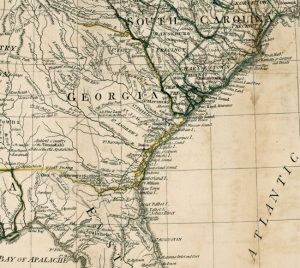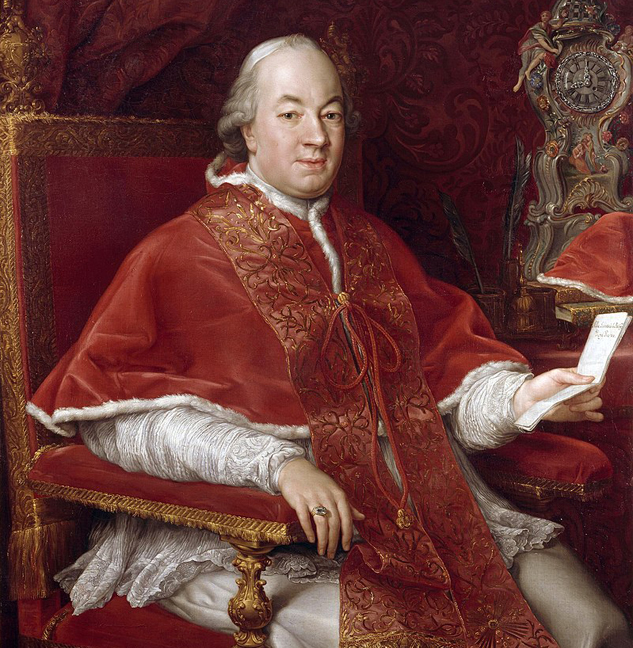
In the autumn of 1776 loyalists from East Florida under Thomas “Burntfoot” Brown and Daniel McGirth frequently raided the southern parishes of Georgia keeping its citizens in constant disarray and disrupting rice and cattle production. The very thin population in the area made defense a difficult proposition. Trying to stop the raids and protect the border, Patriot General Lachlan McIntosh devised a system of frontier forts along the Altamaha River connected by scout patrols “ranging continually to the southward of the Altamaha for intelligence” and to prevent the constant stealing of cattle.[1] His ideas may have been theoretically sound but McIntosh never came close to having enough men and horses to actually maintain an effective defense.
Late in December a large party of Indians “invisted the stocade at Beards Bluff (aka Fort McIntosh) upon the Altamaha River about 40 miles above Fort Howe (aka Fort Barrington).” The horse patrols were busy south of the St. Marys River and in no position to support or even be aware of a problem at the fort.[2] Inside the small stockade (about 100 sq yards), Lt. Bugg commanded a garrison of only 27 men who were seven months into a one year enlistment and never been paid.[3] Needless to say, they weren’t feeling particularly patriotic.
On the morning of the 28th, Lt. Bugg led 12 men out of the fort to scout and assess the situation at hand. Ambushed about 400 yards out, Lt. Bugg’s horse was killed and four of the men struck with arrows. Unfortunately for Bugg and the wounded, “the other 8 Men Scandalously pushed with all speed to the [fort] without discharging a Gun & left their Officer in Distress that occasion’d such a pannick in the whole detachment” that, even though Bugg made it back to the stockade, he was unable to get any of the men “to go out again.” The three men killed in the ambush were later found “scalped & left [with] an arrow sticking in each.”[4]
Bugg requested they hold out for 2 days while reinforcements could be summoned but the remaining 15 men in the fort refused to stay. “They buried their dead & all deserted to the Westward” leaving the Lieutenant alone to travel back to Savannah and report the abandoned fort.[5] General McIntosh said later that the men “behaved in a most shameful manner in diserting their officer & post & by our Articles of War is a Capital offence.” In spite of his anger, McIntosh did not prosecute the deserters but, for the replacements, he rounded up £150 to “keep the men in good humor.”[6] Lt. Bugg resigned his commission a month later.[7]
General McIntosh sent Captain Bostick with a patrol to Beards Bluff to scout the situation at Fort McIntosh. The captain reported back that “a great number of Indians are come over the river & enter’d the province thro’” the hole opened up by abandonment of the fort. General McIntosh responded with orders to “pursue them with all Speed” with every available man before the Creek raiders could get into the Georgia settlements.[8] He wanted to “recover the honor lost by the troops at Beards Bluff.” News of Trenton had just arrived from the north and for “God’s sake let us Georgians shew we only want an opportunity [to] follow their Examples.”[9]
Captain Winn
A couple of days later, Captain Richard Winn of the 3rd Regiment Carolina Horse arrived with 40 men to help with the frontier defense[10]. Winn and his men were veterans of the battle at Sullivan’s Island under General Moultrie the preceding June and brought an extra troop for Georgia’s defense.[11] Troops ranged across the state over the next couple of weeks but never forced any major engagement with the Creek raiding parties. However, they did manage to take “6 other Creek Indians [who] were in the Settlements by way of retaliation.”[12]
The frontier was quiet for a short time as General McIntosh reestablished his policy of small forts along the river while mounted patrols ranged throughout. Captain Winn accepted command of the rebuilt stockade at Fort McIntosh with a 60 man garrison consisting of his own 3rd Carolina troop and a smaller group of less than 20 of the Continentals from Georgia. Their brief period of preparation came to an abrupt end less than a month later.[13]
And then, “on the 17th of February, about the dawn of day, an attempt was made to surprise the garrison, by colonels Brown, Cunningham, and McGirth, with seventy Florida Rangers, and eighty Indians. The assault was continued without intermission for five hours, when a demand was made for a surrender, without any conditions, accompanied by threats of death to the whole garrison in case of refusal.” On receiving Brown’s surrender demand, Winn took an hour to consider the matter before sending out a somewhat pessimistic response. Having trouble trusting the likes of McGirth and Cunningham, the captain sent the following. “I have considered your proposition but am bound in honor to not comply. Should we fall into your hands we shall expect to be treated as prisoners of war.”[14]
The fighting around the fort continued for the remainder of the day by which time Winn had one man killed and three others wounded. The wounded men “suffered greatly for want of a surgeon to dress their wounds.” After a time, the loyalist Colonel Brown withdrew his men into siege positions around the fort while he waited for reinforcements from Colonel Frasier of the British army who led an additional 200 regulars.[15] Altogether with their Creek allies under the great warrior, Cussuppa, Captain Winn figured the enemy force between four and five hundred men.[16]
After dark, Sgt. Owens sneaked out of the fort and disappeared into the night. He carried an message requesting reinforcements from Colonel Harris at Fort Howe. Unfortunately, the roving patrols were already out to the south and Harris only had 40 men available. In light of the forces surrounding Fort McIntosh, Captain Winn’s plan for them to strike from behind while he sallied out from the fort seemed a bit more than his little troop could handle. Harris remained at Fort Howe leaving Winn and the garrison to their fate.[17]
Now under the command of Colonel Frasier, the British renewed their attack on the fort around 9 o’clock the next morning. This time Indians “made near approaches, and sheltered themselves behind logs and stumps, and very much annoyed the besieged by keeping a close watch upon the loopholes.” As the day wore on Winn started to become aware that reinforcements were probably not coming. When Frasier sent him a 2nd demand for surrender at mid-afternoon, Winn wasted two hours in consultation with his officers over the matter.[18]
“When I called them up & after informing them of their dangerous situation & the great force they had to contend with I asked them will you fight with me – their answer was we will not only fight, but Captain, we will die with you to a man.”[19]
In spite of the inspirational spirit of his men, Captain Winn looked at his diminishing supply of powder and determined that some terms were necessary or his men would be slaughtered. Winn and Frasier agreed to meet on the field half-way between the British and the fort to discuss terms for surrender. Winn agreed to surrender the fort and give up two of his officers as hostages but, having heard of Indians killing prisoners “in a northern paper where such a thing did actually take place between Montreal & Albany”, the Captain insisted that a company of British regulars accompany them to the Altamaha as protection from treachery.[20]
So it was that “about four in the Evening of the 18th – the Tower was given up & our arms laid down – the Swords of the Officers demanded by a British officer – my sword I refused to hand him but laid it on a stump – My Officers did the same – In a short time after Colo. Frasier came into the Fort & returned each officer his sword saying it was a practice made by Genl. Washington & he would follow the same.”[21]
With the turnover complete, Winn’s column started toward the settled part of the colony with their British guards. Unfortunately, just as Captain Winn had predicted, “I had not got more than two miles night came on – my guard left me” in spite of their promises to the contrary. Winn feared “that Colo. Brown & the Two Notorious Villains Cunningham & McGirt” would lead the Indians against them but, “after passing through a most dismal country of saw palmetto & swamps” they arrived safely at Fort Barrington on the morning of the 19th.[22]
General McIntosh received news of the siege early in the evening on the same day and tried to send out orders for reinforcements and for a galley to sail up the river with powder and supplies. Unfortunately, before his orders even left camp, “another express arrived informing me Fort McIntosh is taken by 300 regulars & 500 [Indians] & train of Artillery, & expect they will advance on our Settlements.”[23]
As it turned out, the Georgians could rest easy as the British made no serious effort to invade the state in 1777. Instead, they remained content to pull back with all the cattle and supplies they could carry and watch the Patriots mostly comical attempts to mount an invasion aimed at stopping Brown and the other loyalists of East Florida. As for the courageous Captain Winn, he went on the rank of Colonel and served with distinction under Thomas Sumter for the duration of the war.
[1] Brig General Lachlan McIntosh to Lt Colonel William M’Intosh, 22 October 1776, The Papers of Lachlan McIntosh (Savannah, Georgia Historical Society, 1957), 16.
[2] Lachlan McIntosh to General Howe, 30 December 1776, The Papers of Lachlan McIntosh (Savannah, Georgia Historical Society, 1957) 29.
[3] Lachlan McIntosh to General Howe, 7 January 1777, The Papers of Lachlan McIntosh (Savannah, Georgia Historical Society, 1957) 32.
[4] Lachlan McIntosh to General Howe, 7 January 1777, The Papers of Lachlan McIntosh (Savannah, Georgia Historical Society, 1957) 32.
[5] Lachlan McIntosh to General Howe, 7 January 1777, The Papers of Lachlan McIntosh (Savannah, Georgia Historical Society, 1957) 32.
[6] Lachlan McIntosh to General Howe, 7 January 1777, The Papers of Lachlan McIntosh (Savannah, Georgia Historical Society, 1957) 33.
[7] Lachlan McIntosh to N W Jones, Speaker, 15 February 1777, The Papers of Lachlan McIntosh (Savannah, Georgia Historical Society, 1957) 41.
[8] Lachlan McIntosh to William McIntosh & Major Marbury, 8 January 1777, The Papers of Lachlan McIntosh (Savannah, Georgia Historical Society, 1957) 34.
[9] Lachlan McIntosh to William McIntosh & Major Marbury, 8 January 1777, The Papers of Lachlan McIntosh (Savannah, Georgia Historical Society, 1957) 34.
[11] Richard Winn to Hugh McCall, 10 April 1812, reprinted in General Richard Winn’s Notes, http://lib.jrshelby.com/winnrichard.pdf transcription of original http://neptune3.galib.uga.edu/ssp/cgi-bin/tei-natamer-idx.pl?sessionid=7f000001&type=doc&tei2id=KRC119 .
[12] Lachlan McIntosh to Lyman Hall, Dr. Brownson, & George Walton, 23 January 1777, The Papers of Lachlan M’Intosh, (Savannah, Georgia Historical Society, 1957) 37.
[16] Richard Winn to Hugh McCall, 10 April 1812, reprinted in General Richard Winn’s Notes, http://lib.jrshelby.com/winnrichard.pdf transcription of original http://neptune3.galib.uga.edu/ssp/cgi-bin/tei-natamer-idx.pl?sessionid=7f000001&type=doc&tei2id=KRC119 .
[19] Richard Winn to Hugh McCall, 10 April 1812, reprinted in General Richard Winn’s Notes, http://lib.jrshelby.com/winnrichard.pdf transcription of original http://neptune3.galib.uga.edu/ssp/cgi-bin/tei-natamer-idx.pl?sessionid=7f000001&type=doc&tei2id=KRC119 .
[20] Richard Winn to Hugh McCall, 10 April 1812, reprinted in General Richard Winn’s Notes, http://lib.jrshelby.com/winnrichard.pdf transcription of original http://neptune3.galib.uga.edu/ssp/cgi-bin/tei-natamer-idx.pl?sessionid=7f000001&type=doc&tei2id=KRC119 .
[21] Richard Winn to Hugh McCall, 10 April 1812, reprinted in General Richard Winn’s Notes, http://lib.jrshelby.com/winnrichard.pdf transcription of original http://neptune3.galib.uga.edu/ssp/cgi-bin/tei-natamer-idx.pl?sessionid=7f000001&type=doc&tei2id=KRC119 .
[22] Richard Winn to Hugh McCall, 10 April 1812, reprinted in General Richard Winn’s Notes, http://lib.jrshelby.com/winnrichard.pdf transcription of original http://neptune3.galib.uga.edu/ssp/cgi-bin/tei-natamer-idx.pl?sessionid=7f000001&type=doc&tei2id=KRC119 .










2 Comments
I believe Captain Robert Ellison of the 3rd. Regiment to be one of the two hostages detained by Col. Frasier. Can anyone confirm this? Does anyone have additional information to share?